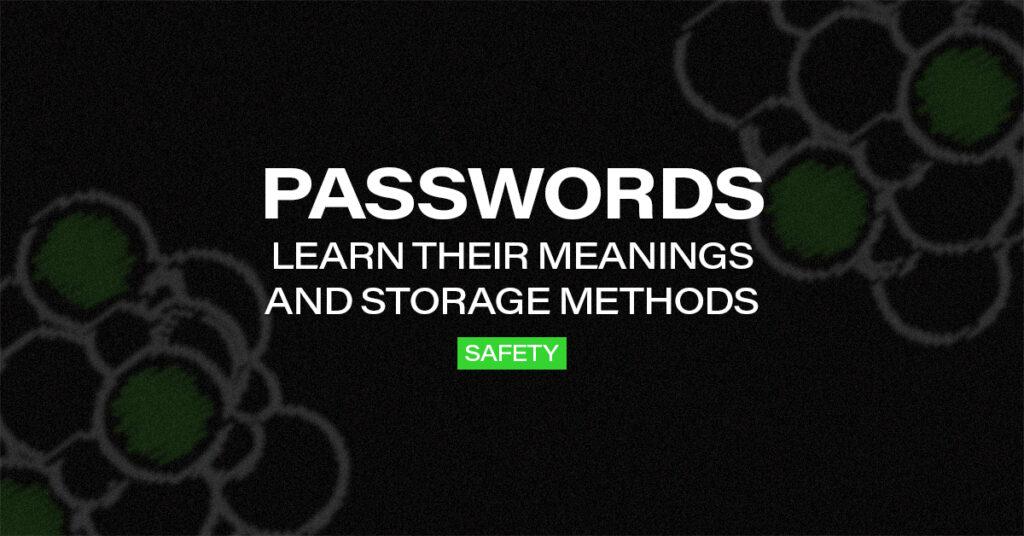Many people are unaware of the amount of personal data they store on the internet and how easily it can be accessed by cybercriminals. The personal information stored in various online accounts can be used by these criminals to not only make purchases, but also steal your identity and create new accounts. Additionally, you may have sensitive information on your computer or on the internet that you would not want to lose or have someone else access.
Password management refers to a set of activities that enable you to store passwords securely, access them quickly, and manage them easily. Passwords are a crucial part of cybersecurity, and they play a vital role in the IT policies of both home users and organisations.
Personal data is stored in many different apps, devices, and websites, and this data can be exploited. Weak-secured applications, databases, and public networks can be used to steal passwords. Additionally, data breaches themselves can lead to significant financial and reputational losses.
To mitigate these risks, corporations are taking several steps to implement secure password management solutions to secure sensitive information. This article will discuss the basics of password management and examine the potential risks associated with digital account breaches.
Password security
Good password security is crucial as it prevents unauthorized access to your accounts. Some people think that not storing personal data on the internet makes them safe, but this is a misconception. The average person has at least a dozen digital accounts, each requiring a password. If a data breach occurs, a criminal can easily access a person’s personal information.
Traditional password management methods are no longer sufficient due to the increasing number of digital accounts. This became more evident in 2021 when remote work became the norm. Losing a password could result in being completely cut off from the office infrastructure. Storing passwords where family or friends can access them is also a significant security risk.

Corporate password security is more complex than personal passwords, as they require shared access. Breaching corporate passwords can result in the loss of sensitive data. A lack of a robust credential management policy invites cybercriminals and puts valuable information at risk.
Remote employees are often easy targets for cybercriminals, so educating employees on cybersecurity and secure password management is essential. However, even the most advanced password management solutions and the strictest company policies can’t help organisations where employees lack an understanding of the risks and how to mitigate them.
Passwords are a simple and effective way to protect data and information systems from unauthorised access. Still, adequate password security and management go beyond creating strong, unique passwords. It’s crucial to consider a few essential factors and actions that can help minimise the risks associated with a compromised password.
Also in this series: Passwords: Importance and ways of storage

Account compromise – possible risks
Identity theft
Cybercriminals who gain access to your accounts can have access to sensitive personal information, including your full name, home address, social security number, or bank account details. This information can be used to impersonate you, open fraudulent credit accounts in your name, and cause a lot of trouble that can take several months or even years to resolve.
Account takeover
It’s important to remember that when multiple people have access to an account, there is a risk that someone may try to take control of that account and block access for the other users. This risk is even more significant when an employee who is unhappy with their job leaves, as they may be more likely to let the password fall into the wrong hands.
In addition, if a password is used on multiple platforms simultaneously, the risk of danger increases exponentially. If someone gains access to one account, they may be able to compromise many others.
Financial losses
Keeping your bank password safe is crucial because anyone with access to it can log into your account and withdraw your funds. Moreover, cybercriminals can use your compromised account to scam your family, friends, or colleagues into giving away their private information or money.
For businesses, a single password breach on an employee’s device can have far-reaching consequences. The entire organisation’s information security is at risk if a hacker gains access to the company’s network structure. In such cases, the likelihood of severe cyberattacks like malware intrusion is much higher, which can lead to significant reputational and financial damage.

Are you planning a digital transformation? Do you need support with technology selection, analysis or coordination of development work?
{Doradztwo technologiczne}
The success of an IT project depends hugely on correct analysis, accurate technology decisions and efficient project management.
Password security methods
It’s important to understand that even if you create a complex password with a combination of uppercase and lowercase letters, numbers, and special characters, it may not be enough to protect your online accounts. If you don’t use password managers or oAuth logins, there’s a high chance you’re using unique passwords for all services but not taking enough measures to keep them safe. To ensure the security of your passwords, there are some additional behaviours you need to adopt.
🟢 Don’t save passwords in an insecure way
You should avoid storing your password in paper or unsecured digital documents. Even if you have created a strong password, all your efforts can be wasted if you give away your credentials to a malicious user. Therefore, keep your passwords safe and secure to prevent unauthorised access to your accounts.
🟢 Don’t log in to services using public Wi-Fi
When using public Wi-Fi networks, your data can be intercepted. Always use secure networks to avoid this risk.
🟢 Change your passwords regularly
Some apps require you to change your password periodically, but it’s essential to change your password regularly to accommodate new security policies.
🟢 Always sign out of your devices
This is particularly important when using shared devices or applications or in public places.
🟢 If possible, enable two-factor or multi-factor authentication
Although having a strong password is crucial, it may not be sufficient to prevent an attacker from accessing your account. The stronger your password is, the lower the possibility of a cybercriminal accidentally guessing or cracking it. However, there is still a potential risk that your password could be compromised.
Multi-factor authentication protects your accounts by combining your primary credentials and additional authentication methods when you sign in, such as:
- A code or prompt from an authenticator app;
- A code from a text message or email;
- Biometric data.
To successfully authenticate to a system using MFA, a hacker would have to gain access to an email account or a physical device such as a phone. Therefore, it is always recommended to enable multi-factor authentication on your accounts. You may consider an account insignificant, but it could still contain vital information. This information could be used to steal your identity or gain unauthorised access to your other accounts.
🟢 Keep your passwords private
Do not write down passwords or store them on paper or digitally in a text document. Also, try not to share your passwords with other people.

Password storage methods
Creating a complex password can help prevent hacking attempts. We already know how to create long, secure passwords unique to each website or application. Most of us have multiple accounts across different services, but fortunately, you don’t need to remember them all. There are several free and paid options available for storing your passwords securely.
Password manager in a web browser
Popular web browsers like Chrome, Firefox, and Safari offer to save passwords. You can enable a feature that prompts you to keep your password whenever you create an account.
Advantages
- Convenience
If you’re using a popular browser, it likely has built-in password storage, so there’s no need to learn a new app.
- Ability to create random passwords
Most browsers have built-in password managers that can generate secure passwords with a mix of uppercase and lowercase letters, numbers, and symbols.
- Passwords are synced across all your devices
Saved passwords sync across devices with web browsers installed for convenience.
- Free solution
A significant advantage of this solution is that the service is completely free.
Disadvantages
- Relative safety
Based on the information available on the internet, it seems that passwords saved in browsers are encrypted, but they do not have any additional security features. It is important to note that the primary purpose of browsers is to assist users in finding information on the Internet rather than secure their personal data.
- Not syncing passwords across browsers
It’s worth noting that some web browsers do not support the import/export of credentials to other browsers.
- Increased risk
Browser-based password managers lack a master password, leaving your credentials vulnerable if your Google account is compromised through Chrome.

Password manager apps
Standalone password managers are an excellent substitute for your browser’s built-in password storage. These tools’ primary function is to securely store all your passwords in a single place. As third-party companies sell these products, they tend to be more feature-rich and innovative than browser-based password managers.
Cloud-based
A password manager stores your data on an external server, making it accessible from anywhere with internet.
Based on the device’s local storage
Desktop password managers are software that stores your passwords and data locally on your device. This means you can access your saved information without an internet connection. A significant advantage of a desktop password manager is that it provides high-level security since it doesn’t rely on a server that hackers can access.
However, this type of solution requires regular backups to prevent data loss. Also, you might face synchronisation issues if you need to access your passwords from multiple devices.
Advantages
- High level of security
Your credentials are stored in encrypted form and accessed only after proper authentication, often including multi-factor authentication for increased security.
- Extensive functionality
A password manager offers more than just storing passwords. It also provides dark web monitoring, regular password strength tests, and other useful security tools.
Disadvantages
- They are usually paid solutions
Unlike browser-based managers, standalone managers often require a purchase but offer extra services for improved user security.
- Less convenience
Some password managers require manual copying and pasting of login details. This can be highly time-consuming for some users.
Summary
With the increasing number of online services and technological advancements, cybersecurity has become a significant concern today. Password guessing or cracking remains the most common way hackers access your digital accounts and devices. Weak passwords and commonly used ones are the primary cause of data breaches. Therefore, individuals and organisations should carefully review their security policies and password management. When protecting sensitive business data, companies must increase their password security by implementing security protocols and using additional methods such as multi-factor authentication.
Incorporating additional security mechanisms can make the authentication process more secure and resistant to hacking. Along with strong password protection, businesses can utilise several elements to ensure a robust multi-factor authentication process, such as:
• Verification questions – users will be required to answer security questions regarding their personal information.
• Biometric data – data such as fingerprints, eye scans or facial recognition may be scanned to uniquely verify the user.
• Additional credentials – two-factor authentication can be implemented by sending and verifying one-time PINs or access codes.
Understanding the importance of a strong password and the consequences of not handling it properly is vital for individuals and businesses alike. Failing to protect oneself against cyber attacks can result in irreparable damage, including losing confidential information, personal data, finances, and even identity theft.
To keep your online accounts secure, it’s important to create and maintain robust passwords. This will help prevent unauthorized access by cybercriminals and protect your personal information.
Are you considering a software development project and care about security?
Take advantage of our free consultation. We will tell you how to start and implement your idea effectively.




